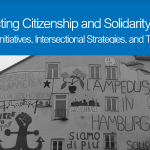Monograph - 2022
Author: Donatella della Porta
Social movements have often played an important role in emergencies, mobilising in defence of those rights that they perceive as being at risk or more urgently needed than ever. In general, progressive social movements develop in moments of intense change, mobilising with the aim of turning them to their advantage. the variable mix of challenges… moreJournal Article - 2022
Author: Andrea Pirro
This contribution makes the case for a shift in boundaries between the (populist) radical right and the extreme right, arguing for the systematic use of the term ‘far right’. The significance of a deliberately generic but fundamentally meaningful concept such as ‘far right’ is motivated by the growing links between illiberal-democratic (‘radical right’) and anti-democratic… moreJournal Article - 2022
Author: Andrea Pirro & Ben Stanley
In recent years, Central and Eastern Europe have furnished several examples of illiberalism in power. The most prominent and consequential cases are Fidesz, which has ruled in Hungary since 2010, and Law and Justice (PiS), which has ruled in Poland since 2015. In both cases, illiberal governments have embarked upon an extensive project of political… moreMonograph - 2022
Author: Donatella della Porta, Riccardo Emilio Chesta, Lorenzo Cini
Journal Article - 2022
Author: Giovanni Esposito, Andrea Felicetti, Andrea Terlizzi
Megaprojects are increasingly common across countries and attract substantial political attention from a variety of actors. Recent studies have highlighted the need to move from an understanding of megaprojects as linear and rational processes towards a more nuanced approach that accounts for non-linear and conflictual aspects. Participatory governance is often proposed as a valuable resource… moreJournal Article - 2022
Author: Andrea Pirro
The first year of COVID-19 confirmed the standing of the populist radical right in Italy. While sitting in opposition at the national level, Giorgia Meloni's Brothers of Italy and Matteo Salvini's League shared common criticism of the Conte II government but experienced diverging trajectories in terms of popularity. The first had enjoyed growing support since… moreJournal Article - 2022
Author: Manuela Caiani e Guglielmo Meardi
The growing interest in the populist phenomenon worldwide, which previously was centred on its protest and opposition functions, now includes its role in government. As a result in the recent years, research has shifted from the study of populism as an opposition, anti-system movement to the question of what populist governance and populist policies are.… moreJournal Article - 2022
Author: Andrea Pirro & Paul Taggart
The populist use of tropes such as conspiracy theories plays an increasingly important role in their politics. Populism and conspiracy theories present a number of common traits – Manichaeanism, a sense of victimhood, and an ambivalence towards representative politics – and populists’ use of conspiracy theories is politically purposeful. Targeting a conspiring elite serves to… moreMonograph - 2022
Author: Donatella della Porta, Niccolò Bertuzzi, Daniela Chironi, Chiara Milan, Martín Portos & Lorenzo Zamponi
Drawing interview material, together with extensive data from the authors’ original social movement database, this book examines the development of social movements in resistance to perceived political "regression" and a growing right-wing backlash. With a focus on Italy and the reaction to increasing inequalities and welfare state retrenchment policies, it examines opposition to the government… moreJournal Article - 2022
Author: Lorenzo Bosi, Lorenzo Zamponi
Le molte forme di solidarietà e mutualismo dal basso che si sono manifestate in questi anni, sia nel contesto della crisi economica sia in risposta alla pandemia di Covid-19, dalle grandi organizzazioni sociali alle occupazioni abitative, dai gruppi di acquisto solidale alle fabbriche recuperate, passando per i centri sociali e le sperimentazioni di welfare dal… more21/03/2024

16/05/2023
22/02/2023

16/02/2023

10/01/2022

16/07/2021

Journal Article - 2023
Journal Article - 2023
Journal Article - 2023
Journal Article - 2023
Monograph - 2023
Monograph - 2022
Monograph - 2022
Journal Article - 2021
Monograph - 2021
Journal Article - 2021